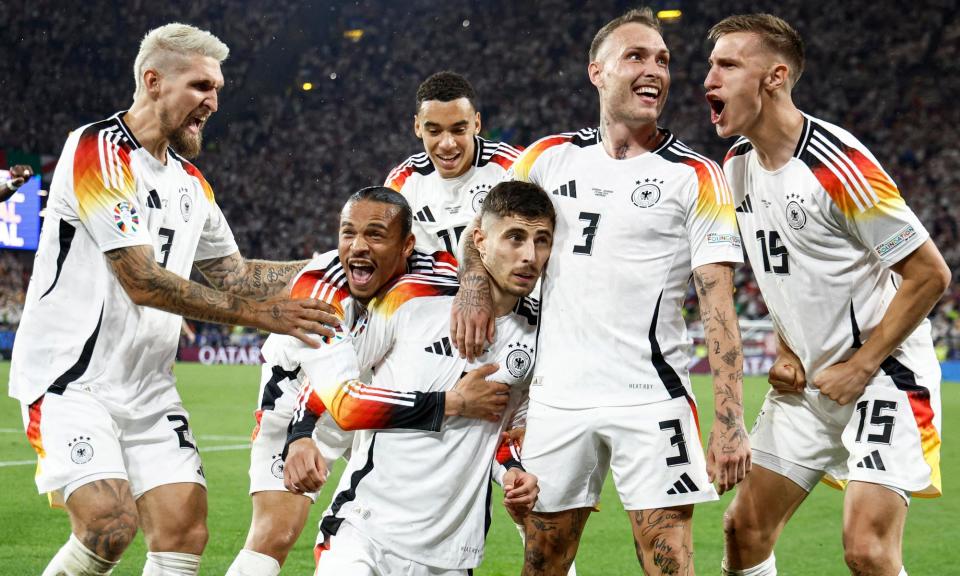Germany’s Havertz and Musiala shrug off storm delay to sink furious Denmark

The elements knocked a wild, sometimes thrilling match off kilter and then the deadening technocracy that is smothering elite football took its turn, too. At the end of it all Germany could celebrate to the strains of new wave classic Major Tom, their unofficial anthem, and perhaps dare to fantasise about a new summer fairytale. Much of the night had resembled a fever dream but the prospect of going all the way in their home tournament has become real for Julian Nagelsmann’s team.
Related: Denmark’s Hjulmand attacks ‘ridiculous handball rules’ after defeat by Germany
They will need to be better than this if, as seems likely, they face Spain in the quarter-finals. Germany looked like blowing Denmark away early on but, having not done so, had become a skittish mush by the time a cataclysmic weather intervention stopped proceedings for nearly half an hour during the opening period. They eventually pulled clear but had, in large part, to thank a handball law that is offensive to the sport’s spirit. Once Kai Havertz had scored from the penalty spot the air was sucked out of a pleasantly bold Denmark side.
Where to start? Perhaps with some of the football, even if the rule that facilitated Germany’s opener should have no place in the sport. Denmark had picked up from where they left off after half-time and felt hard done by when Joachim Andersen, having lashed past Manuel Neuer for what was seemingly a deserved lead, had his celebrations curtailed. Thomas Delaney had swung at the ball and missed just before Andersen applied the finish but was adjudged, through VAR, to have strayed offside by a toenail’s length.
Straight down the other end, and the marauding Germany left-back David Raum had men to aim for in the centre. His cross glanced off Andersen’s hand, a fact picked up by the VAR official Stuart Attwell and the “snickometer” deployed in the control room, and it was enough for Michael Oliver to award a penalty after pulling play back. Havertz converted and, for any neutral, the fun was over.
Andersen had been at close quarters to Raum and his arm, while not beside his body, was hardly outstretched. The decision was probably correct, according to a strict interpretation of handball’s modern definition. But the law needs calling out loudly for what it is: a ruinous example of overreach that makes the sport appreciably worse.
It would probably be a cheap shot to correlate such farce with the oversight of Premier League officials, even if handball controversies resemble catnip to those refereeing and re-refereeing English matches. Oliver’s night had been difficult enough already. Denmark were dominating when, just after the half-hour, a portentously close and muggy evening became something far more serious.
The heavens opened, as they had been threatening to; forked lightning cracked the night sky and loud, ominous claps of thunder shuddered the stands. With 35 minutes played Oliver led the players off, first to the side of the pitch and then down the tunnel as conditions continued to deteriorate. The playing area was patently unsafe and for a time proceedings seemed at risk of being curtailed altogether.
Eventually conditions eased and play could resume. The famous Südtribüne, part of which had emptied out to escape a biblical drenching, refilled and bedded in for a contest that had already delivered. Germany had called Kasper Schmeichel into action four times in the first 11 minutes, saves from Havertz and Joshua Kimmich particularly eye-catching, while Nico Schlotterbeck had a header ruled out. But they had become nervous and twitchy after not putting Denmark to the sword. Before the unscheduled break Christian Eriksen and Joachim Maehle had been given openings and the ingredients for a classic, if a flawed and ragged one, were present.
Schmeichel made an even better stop from Havertz shortly after Oliver had led the sides back out, and before half-time Rasmus Højlund was denied one-on-one by Neuer. Denmark had been chastised back home for dull group stage performances but they had evidently spied an opportunity and, at this point, looked the better side.
Then came the extraordinary sequence that Andersen, the Crystal Palace defender, may struggle to shrug off. Germany could enjoy themselves after going ahead and should have settled things soon after when Havertz, who had held off the claims of local hero Niclas Füllkrug and kept his starting place, escaped the defence with sublime skill only to miss the target. Leroy Sané, recalled to the starting lineup by Nagelsmann, then missed a sitter of his own.
It fell to Jamal Musiala, who had been relatively quiet, to run on to a laser-like pass from Schlotterbeck and see the whites of Schmeichel’s eyes. There was no redemption available to Andersen, who had seemed hesitant in trailing him. Musiala finished superbly for the third time in a European Championship that he has illuminated. Germany, rampant on the break but profligate, could have scored several more after that.
Few can begrudge this Germany side a crack at the last eight. Kasper Hjulmand certainly did not but the Denmark manager knew where the evening had turned.
“This is not how football is supposed to be,” he said of the calls that sent them home. As rumbles and flashes started up anew outside, someone seemed to agree.

